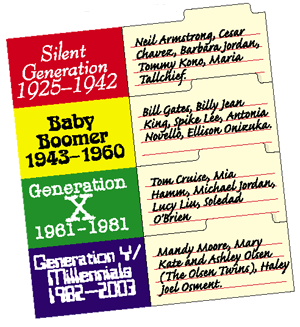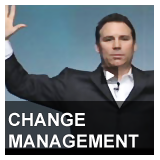Generational Differences Speaker Garrison Wynn
Garrison's research-based keynotes for managing a multi-generational workforce include essential tools and knowledge to help managers attract and motivate younger workers. His extremely informative programs won't offend or demean any age group. The research makes sense to all generations, so buy-in from leaders is quick and the solutions you implement have almost immediate impact.
Millennial Loyalty
Keeping and Attracting Top Young Talent
People in their 20s don't want what their parents wanted from a job. They are also more likely to live at home and less likely to put up with a work environment that cramps their style. What a shift in mindset! Attracting the young people needed to replace your retiring workforce (and making sure they stay long enough to make a difference) is crucial for your organization's future. This entertaining yet heavily researched program shows business owners, leaders and managers how to adapt their organization into a company young people want to work for and how to establish a culture they do not want to leave. Besides actually having a work force 10 years from now, the benefits include improved performance and heightened accountability from the millennials who represent your company's future.
Inquire about this program
Attract, Manage, Motivate
and Keep Younger Workers
Some employers struggle to attract talented workers under age 30, and still more find it challenging to get these Generation Y employees to achieve its best. Then, just when managers stumble upon methods that seem to motivate, they leave for more attentive management elsewhere. Wynn Solution's new, research-based program reveals what type of business image and work environment will entice the best young workers, which modern management techniques will keep them motivated, and which incentives will keep them from defecting. Inquire about this program
Generations Working Better Together
This extremely informative, entertaining, solutions-based session explores why younger and older people don't see eye to eye and what to do about it in the workplace. From pointers on motivating, managing and retaining younger employees to ways of preventing older managers from losing their minds, this research-based program shows it's possible for baby boomers and Gen X and Y employees to work well together.
The under 30 workforce Generation X on steroids: high-performance, high maintenance and a strong sense of self-worth
- What we think of younger people: Opinions, assumptions and work ethic
- What they think of us: Misguided, work-addicted and slow
- Understanding what happened: A change in parenting and the elementary school system
- Generational stereo types and categories: Millennial's, Gen X, Baby boomers and Traditionalist
Being effective with older workers: Lessons of the young leader
- Being viewed as the punk-manager: Big mistakes you don't have to make
- What older employees need from their younger bosses
- How older workers feel about changing technology and systems
The big mistake: Wishing they were like us
- A lack of strategic thinking: Older and younger generations
- Knowing what you cannot change
- You were never young once: You can't walk in another generation's shoes
Building an effective relationship quickly: What's working and what's not
- Asking the right questions
- Knowing what they value
- Making sure you see their value
Turning talent into performance
- How older and younger employees view goal achievement (20's, 30's, 40's, 50's, 60's)
- The difference between talent and skill
- Are you doing all you can to improve performance
Coaching social skills in younger employees
- A question of respect: The rules have changed
- You can't be influential unless you know what someone values: Finding out what's important
- What younger generations deem irrelevant
- We are living in their time: Acceptance and coping skills
When was your time
- Getting over the hump: A very difficult truth
- Doing what works for everyone
Business Etiquette
for Generation Y
Your new young hires sure know their way around PowerPoint and PDAs, but their habitual typos and cryptic e-mails stump clients and stagnate your business. From customer encounters to business dinners to effective writing, the under-30 set often lacks the experience needed to put the company's best foot forward. With humor but without condescension, this session delivers pointers on professionalism and emphasizes business etiquette among a generation that values self-expression over corporate expectations. Inquire about this program
Getting Great Results:
Turning Talent Into Performance
In this keynote, results from the largest management survey ever conducted are combined with real-life management and leadership solutions to get the most from your people, regardless of their skill level. Participants learn to manage their ego-driven top producers, how to listen like leaders and make their people feel heard, how to hire for talent and turn it into top performance, how to create a culture of excellence with their most promising people, and how to help their low performers to fight their way to the middle. Inquire about this program
When baby boomers and employees in their 20s and early 30s work side by side, the generation gap can look more like a canyon. Employers can do more than just stand by and watch as crisis looms. Effective solutions do exist:
Strategy: Create repeatable processes for bringing Millennial employees on board and keeping them.
Strategy: Get customized programs for your industry so you can gain the tools to reduce generational conflicts and improve productivity.
Strategy: Implement management and business etiquette programs to groom future leaders and get younger workers ready to represent your organization with the professionalism you need.
What's working: Motivating Generation Y by understanding why they think and feel the way they do and using that information to influence them.
What's not working: Trying to make them act like you! Wynn Solutions' research shows you can't make a 25-year-old think like a 45-year-old. You have to work with young employees by meeting them where they are, not where you wish them to be.
In today's corporations, generational differences jump out at managers:
One generation of employees exhibits maturity and steadfast loyalty, while workers of a younger generation who show brilliance and application have an exit strategy ready if boredom or dissatisfaction sets in.
Population booms and generational differences in mind-set combine to create adverse conditions that will gradually worsen, creating a perfect storm that can spell disaster for employers. Consider:
- 50 percent of the American workforce will retire within seven years.
- The largest number of college graduates will enter the workforce in 2009.
- Many managers lack the skills needed to motivate and retain talented younger employees.
- Unable to attract young people, some industries run the risk of being unequipped to compete in the future.
What makes people under 30 the way they are?
The elementary school system changed how teachers taught and rewarded for accomplishment. Teachers praised students along the way to the goal, not just when a task was completed. They stopped to celebrate along the way to success, creating motivation through little rewards rather than a big reward at the end. The teachers also promoted self-esteem by making sure every child knew he or she was cared for regardless of accomplishments. The recurring message delivered through this approach goes like this: "We love you; we know you can do it; and here is a little prize at the halfway mark to prove that to you." This under-30 group is shaped by more than just the educational process; they also grew up in the most affluent society the world has ever known. We gave them a lot and told them they could have anything they wanted in life. Now, the under-30s are here to collect! The bottom line: We did it!
So what's the good news about the under-30 set?
The majority of workers in this group are very capable and committed to each other. No generation has ever had the loyalty to each other that this group possesses. They work well in teams and achieve remarkable results in record time if managed effectively. It's true that they want to do this wearing flip-flops, but the results we have seen from the well-managed are impressive.
Each generation, it seems, is uniquely suited for the evolving world it will inherit. If you watch the news these days, you hear the latest reports on celebrity rehab alumni as the words scrolling across the bottom of the screen give you the death toll in Iraq. Who can make the most of a world like that? They can! The under-30s have no problem with it; over informed and underdressed, they will navigate the busy future with ease.
What's up with the over-40s? They seem kind of stressed out!
The over-40 group was raised to believe that working hard is proof of commitment (in reality, you can bust your butt and secretly hope the company goes under so you don't have to quit). Also, they think working late proves that you are working hard. They think that leaving before 5 p.m. means you are not management material, while the under-30s believe that working until 8 p.m. every night just means you lack time management and life balance. The under-30s grew up in families where Mom or Dad or both, always worked late.
Additionally, most research shows the over-40 males believe they are what they do for a living. In one interview, I asked a 49-year-old salesman who he was when he was not working. He said, "Well, mostly, I am always working. But when I'm not, I guess deep down inside I'm a relationship
How can we get more productivity from the under-30 group?
Wishing people were like you is not a strategy. You have to motivate the under-30s the way they grew up being motivated. They need to be praised along the way to the goal. Celebrate the small victories on the road to success and quit telling these workers about five-year plans; their plan in five years is to have a new plan. This plan mostly likely will not involve you or your company (no offense). Give them short, tight deadlines and make sure your objectives are not hindered by low-tech tools. If their computer at home is twice as fast as the one at work, they have a crummy job. And most important, they want to do a good job and get a reward in the first week. Make sure you have system that will allow that to happen. And finally, if thinking about these tips is causing you to lose the will to live, remember that our society created these people so now we have to make sure they can get the job done.
How can we get the over-40s to see we can do the job much more effectively if they would let us do it a little bit our way?
Let them know you understand the old way first. If you have an innovative new system and you fail their little quiz on the old one, you're toast. Also, make sure you seek their counsel. If you are 27 and your coworker is 41, you need to make sure he knows that you know that his experience is an asset to your decision-making process. I was a department head at 27 years old with 35 direct reports who were all in their 30s and 40s. I did not heed this advice personally in those days so my nickname was "Punk-boy manager." It's hard to wield authority with that label floating around the office.
What the over-40 group really wants from you is gratitude and respect. If you can fake that, you've got it made!
What do we need to do to work more effectively with each other as a team?
Get over ourselves! People who grow up at different points in history have a unique experience and outlook toward life. It's always been that way and will mostly likely continue. And though these differences seem a bit greater than some in the past, they are in effect natural. We have already established in the past 30 years that dealing with diversity and understanding each other's differences is critical to communication and success. So, letting people be who they are and dealing with it is not new. It's easy to say, "We were all young once" but the truth is we were not all young under the same circumstances. Case in point: When I was in high school, sex wouldn't kill you and no one told me I was responsible for the environment.
One day the under-30 group will grow up (soon, I hope) and will face a new crop of young people. They will be saying things like "What do you mean we can't come to work naked? It's natural. And besides, global warming has made clothing irrelevant!"










